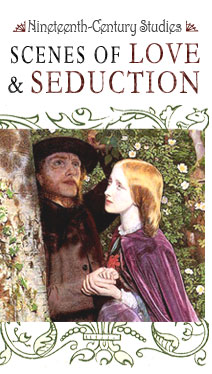Alfred, Lord Tennyson, from "Locksley Hall," (1842)
Transcribed from pages 246-249 of The Poetical Works of Alfred Tennyson, published in 1891 by the National Library Association.
scene one: Beach scene that leads to regret
- Here about the beach I wander'd, nourishing a youth sublime
- With the fairy tales of science, and the long result of Time;
- When the centuries behind me like a fruitful land reposed;
- When I clung to all the present for the promise that it closed:
- When I dipt into the future far as human eye could see;
- Saw the Vision of the world and all the wonder that would be.—
- In the Spring a fuller crimson comes upon the robin's breast;
- In the Spring the wanton lapwing gets himself another crest;
- In the Spring a livelier iris changes on the burnish'd dove;
- In the Spring a young man's fancy lightly turns to thoughts of love.
- Then her cheek was pale and thinner than should be for one so young,
- And her eyes on all my motions with a mute observance hung.
- And I said, "My cousin Amy, speak, and speak the truth to me,
- Trust me, cousin, all the current of my being sets to thee."
- On her pallid cheek and forehead came a colour and a light,
- As I have seen the rosy red flushing in the northern night.
- And she turn'd her bosom shaken with a sudden storm of sighs —
- All the spirit deeply dawning in the dark of hazel eyes —
- Saying, "I have hid my feelings, fearing they should do me wrong";
- Saying, "Dost thou love me, cousin?" weeping, "I have loved thee long."
- Love took up the glass of Time, and turn'd it in his glowing hands;
- Every moment, lightly shaken, ran itself in golden sands.
- Love took up the harp of Life, and smote on all the chords with might;
- Smote the chord of Self, that, trembling, pass'd in music out of sight.
- Many a morning on the moorland did we hear the copses ring,
- And her whisper throng'd my pulses with the fullness of the Spring.
- Many an evening by the waters did we watch the stately ships,
- And our spirits rush'd together at the touching of the lips.
- O my cousin, shallow-hearted! O my Amy, mine no more!
- O the dreary, dreary moorland! O the barren, barren shore!
- Falser than all fancy fathoms, falser than all songs have sung,
- Puppet to a father's threat, and servile to a shrewish tongue!
- Is it well to wish thee happy? — having known me —to decline
- On a range of lower feelings and a narrower heart than mine!
- Yet it shall be; thou shalt lower to his level day by day,
- What is fine within thee growing coarse to sympathize with clay.
- As the husband is, the wife is: thou art mated with a clown,
- And the grossness of his nature will have weight to drag thee down.
- He will hold thee, when his passion shall have spent its novel force,
- Something better than his dog, a little dearer than his horse.
- What is this? his eyes are heavy; think not they are glazed with wine.
- Go to him, it is thy duty, kiss him, take his hand in thine.
- It may be my lord is weary, that his brain is overwrought:
- Soothe him with thy finer fancies, touch him with thy lighter thought.
- He will answer to the purpose, easy things to understand —
- Better thou wert dead before me, tho' I slew thee with my hand!
- Better thou and I were lying, hidden from the heart's disgrace,
- Roll'd in one another's arms, and silent in a last embrace.
- Cursed be the social wants that sin against the strength of youth!
- Cursed be the social lies that warp us from the living truth!
- Cursed be the sickly forms that err from honest Nature's rule!
- Cursed be the gold that gilds the straiten'd forehead of the fool!








